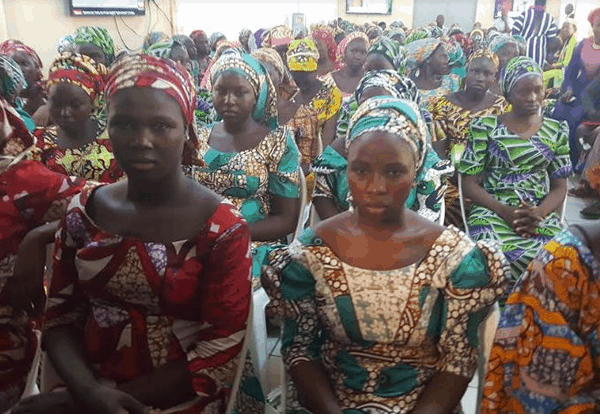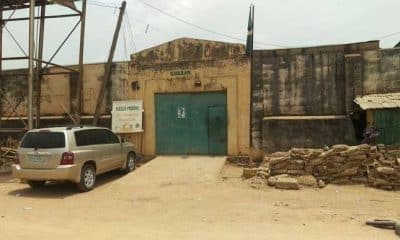Nigeria News
Boko Haram initially wanted to rob the school, not abduct us – freed Chibok girls


Abducted Chibok Secondary School girls who were among the 82 recently released by Boko Haram claims the original intention of the insurgents was to rob the school — not abduct the girls.
According to a diary by the chibok girls, unveiled in an exclusive report by Reuters, life in the Sambisa involved “regular beatings, Koranic lessons, domestic drudgery and pressure to marry and convert”.
The girls wrote in the diary that their abduction by the terrorists, which has become a global issue, was accidental.
The secret diary, written by more than three of the abducted girls when they were in Sambisa, revealed that their mass abduction was the accidental outcome of a botched robbery.
While recalling the events of the night of their kidnapping in April 2014, Naomi Adamu one of the writers of the secret diary, described how Boko Haram had not come to the school in Chibok to abduct the girls, but rather to steal machinery for house building.
Unable to find what they were looking for, the militants were unsure what to do with the girls.
Arguments swiftly ensued.
“One boy said they should burn us all, and they (some of the other fighters) said: ‘No, let us take them with us to Sambisa (Boko Haram’s remote forest base) … if we take them to Shekau (the group’s leader), he will know what to do,” Adamu wrote.
Reuters said the authenticity of the diaries, written by Adamu and her friend Sarah Samuel, could not be verified.
The diaries shed light not only on the horrors the girls endured under Boko Haram, but their acts of resistance, and their staunch belief that they would one day go home.
The girls said they started documenting their ordeal a few months after the abduction, when Boko Haram terrorists gave them exercise books to use during Qoranic lessons.
To hide the diaries from their captors, the girls would bury the notebooks in the ground, or carry them in their underwear.
Three of the other Chibok girls also contributed to the undated chronicles written mainly in passable English, with some parts scribbled in less coherent Hausa.
“We wrote it together. When one person got tired, she would give it to another person to continue,” Adamu, 24, said from the state safe house in the capital, where the girls are being kept for assessment, rehabilitation and debriefing by the government.
The girls’ spirits remained intact, as they devised amusing and mocking nicknames for the fighters, the diaries show. Yet cruelty and brutality were ever present.
When five girls tried to escape, the militants tied them up, dug a hole in the ground, and turned to one of their classmates.
The jihadists handed her a blade and issued a chilling ultimatum: ‘cut off the girls’ heads, or lose your own’.
“We are begging them. We are crying. They said if next we ran away, they are going to cut off our necks,” Adamu wrote.
On another occasion, the militants gathered those girls who had refused to embrace Islam, brought out jerrycans and threatened to douse them in petrol then burn them alive.
“They said: ‘You want to die. You don’t want to be Muslim, we are going to burn you,” read the diary entry.
As fear set in, the militants cracked into laughter — the cans contained nothing but water, the girls wrote.
One of the most striking excerpts illustrates the pervasive fear spread by Boko Haram in Northeast Nigeria, where the group has killed 20,000 people and uprooted at least 2 million in a brutal campaign that shows no signs of ending soon.
During their captivity in the Sambisa forest, some of the Chibok girls escaped and ended up in a nearby shop where they asked the owners for help, as well as food and water.
“The girls said: ‘We are those that Boko Haram kidnapped from (the school) in Chibok,'” Adamu wrote. “One of the people (in the shop) said: ‘Are these not Shekau’s children?'”
The shop owners let the girls stay the night.
But the next day they took them back to Boko Haram’s base, where the girls were whipped and threatened with decapitation.
Despite being flushed with relief at her own freedom, Adamu worries about her closest friend and co-author, Samuel, who is still with the group, having married one of its militants.
“She got married because of no food, no water,” Adamu said from the government safe house in Abuja.
“Not everybody can survive that kind of thing,” she added. “I feel pained … so pained. I’m still thinking about her.”












